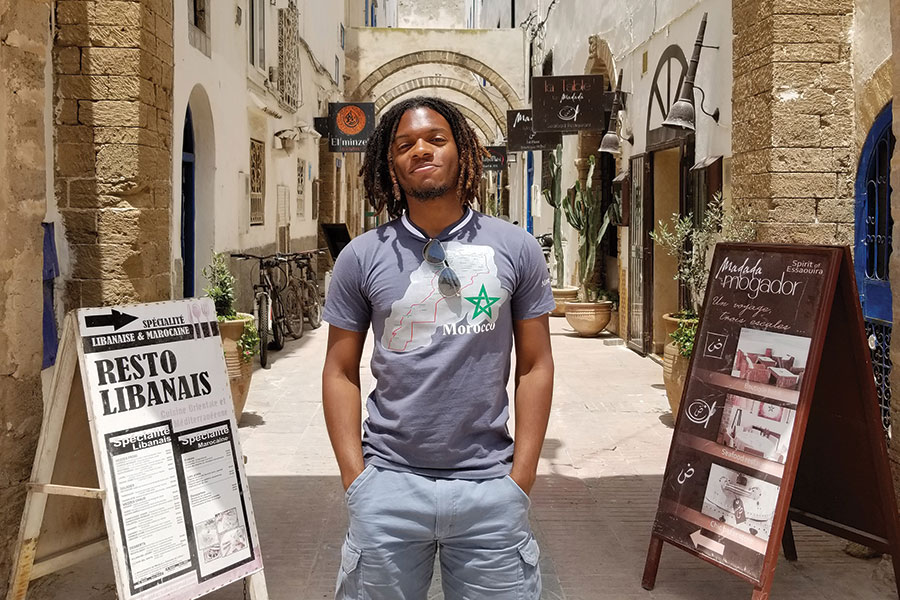LEARNING BY DOING
Culture Shift
A Moroccan internship underlined the intangible benefits of global experiences for Malik James ’19.
by Robin L. Flanigan

Malik James '19 in Morocco
During an internship this summer in Morocco, Malik James '19 lived in the medina—a highly populated, pre-colonial section of a city with towering walls, narrow streets, and historic mosques.
“There were so many people pushing up on you in the crowded streets,” recalls James, who spent seven weeks there teaching English to local schoolchildren, women, and migrants and refugees from sub-Saharan Africa. “Generally speaking, they don’t acknowledge personal space like Americans do.”
The cultural changes were drastic. “And I don’t like a lot of change,” he adds.
Now back home, the legal studies major and sociology minor is processing how the unfamiliar landscape—and his experiences in it—have affected him.
Instead of learning about people fleeing persecution in their homelands from 4,800 miles away, he heard powerful stories firsthand from his students. They would confide in him during personal tutoring sessions, which made it easier for James to build a rapport with them and, ultimately, develop an appreciation for “being in a place of action.”
He considers himself a much more positive and thankful person. “It put a check on my privilege,” he says.
James specifically chose to apply for an internship in a developing country to challenge himself. Even though he selected a study-abroad program unaffiliated with Nazareth, Nevan Fisher, Ph.D., associate vice president for global programs and executive director of the Center for International Education, helped secure aid anyway.
“He stressed it would be hard to get funding, but he spent four months working behind the scenes, talking to as many people as he could, to get as much as he could,” recalls James. “It was a testament to his support for me to study abroad. He found a way where there was no way.”
In addition, the Center for Life’s Work was able to contribute financially because James sought counsel there about earning credits while overseas.
The temporary nature of James’s assignment had some of his students thinking they could slack off. After he “put my foot down on the second day,” those students came to class on time, followed directions, and even confided in him during personal tutoring sessions about being targets of discrimination.
When teaching English, James focused on linking verbs and vocabulary words that had to do mostly with food and transportation. “We would play games,” he says. “I was a cashier, and they would have to give orders in English as a customer.”
To brush up on his French, which is Morocco’s second most popular language behind Arabic, James—who regrettably dropped French as a minor after freshman year—was placed when he arrived in a two-week intensive class for beginners.
In the classroom, everyone was a beginner of sorts. As for James, who “came with expectations that ended up being defied every other day,” he learned to lighten up on the rigid structure he had set for himself. These days he realizes that life doesn’t go as planned. Not after having to deal with an unfamiliar culture, a stiff language barrier, and even eating chickens he had helped raise and that his host family slaughtered for a celebration.
“I’m reflecting more every day about how this has changed me,” James says. “When you go abroad, the people will surprise you, support you, and sometimes they will challenge you. But one thing for sure is they will teach you to become a better person.”
Robin L. Flanigan is a writer in Rochester, New York.
What's Next
Malik James was selected by the New York State Senate for its four-month Undergraduate Session Assistants Program, an internship opportunity to experience state government and the legislative process in-depth in Albany.
Study Abroad Doubled
Naz student participation in international-study programs doubled in 2017–18, compared to the previous year. Read the Pack Your Passport story »